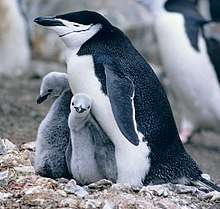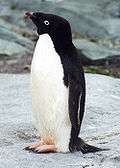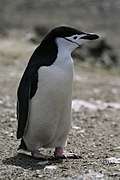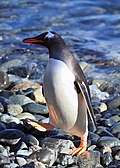Pygoscelis
The genus Pygoscelis ("rump-legged") contains three living species of penguins collectively known as "brush-tailed penguins".[1]
| Brush-tailed penguins Temporal range: Eocene to present | |
|---|---|
 | |
| Pygoscelis antarctica | |
| Scientific classification | |
| Kingdom: | Animalia |
| Phylum: | Chordata |
| Class: | Aves |
| Order: | Sphenisciformes |
| Family: | Spheniscidae |
| Genus: | Pygoscelis Wagler, 1832 |
| Species | |
|
Pygoscelis adeliae | |
Taxonomy
Mitochondrial and nuclear DNA evidence suggests the genus split from other penguins around 38 million years ago, about 2 million years after the ancestors of the genus Aptenodytes. In turn, the Adelie penguins split off from the other members of the genus around 19 million years ago.[2]
- Extant species
| Image | Scientific name | Common Name | Distribution |
|---|---|---|---|
 | Pygoscelis adeliae | Adélie penguin | Antarctica |
 | Pygoscelis antarctica | Chinstrap penguin | Antarctica, Argentina, Bouvet Island, Chile, the Falkland Islands, the French Southern Territories, and South Georgia and the South Sandwich Islands |
 | Pygoscelis papua | Gentoo penguin | Falkland Islands, South Georgia and the South Sandwich Islands, and Kerguelen Islands |
- Fossil species
- Pygoscelis grandis (Bahía Inglesa Formation, Late Miocene/Early Pliocene of Bahía Inglesa, Chile)
- Pygoscelis calderensis (Bahía Inglesa Formation, Late Miocene of Bahía Inglesa, Chile)
- Pygoscelis tyreei (Pliocene of New Zealand)
The latter two are tentatively assigned to this genus.
gollark: Why would you assume *that*?
gollark: You can use stuff like F# which lets you use the OOPy stuff but write functional code.
gollark: I think OOP is mostly powered by inertia.
gollark: Yes, because companies are always 100% efficient.
gollark: I know OOP tends to be used more.
References
- "Pygoscelis". www.pinguins.info. 2000. Archived from the original on 2010-05-01. Retrieved 2016-10-02.
- Baker AJ, Pereira SL, Haddrath OP, Edge KA (2006). "Multiple gene evidence for expansion of extant penguins out of Antarctica due to global cooling". Proc Biol Sci. 273 (1582): 11–17. doi:10.1098/rspb.2005.3260. PMC 1560011. PMID 16519228.
This article is issued from Wikipedia. The text is licensed under Creative Commons - Attribution - Sharealike. Additional terms may apply for the media files.